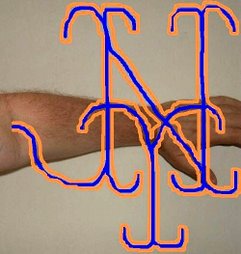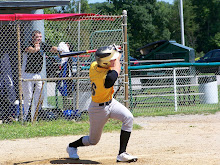
 Pagan took a bad route to a ball in the left-center field gap and let it fall; Perez just pitched badly
Pagan took a bad route to a ball in the left-center field gap and let it fall; Perez just pitched badlyI'm actually kind of relieved that the Mets lost the way they did yesterday. It was ugly, turn the page. The bullpen didn't blow it, the offense can't really be blamed, it was just a terrible day. And maybe it was one of those wake-up call blowouts, just what the Mets needed to finish a month where, quite frankly, they're lucky that .500 ball has kept them within a game of first place.
So I'm not too concerned about yesterday, in particular. Are the Mets lucky that despite the ongoing inconsistency, the Florida Marlins are still the only thing between them and the top of the NL East? Yes. Do I continue to be disturbed that we're still seeing a lot of the same things that sealed our fate last year? Yes. Will our upcoming road trip to Arizona and LA tell me a lot more about where we're at right now? Absolutely. Micah Owings, Brandon Webb, Dan Haren. We match up okay, with Maine, Pelfrey, and Santana, but if we win two games this weekend I'll still be shocked. The D Backs are 20-8 for a reason.
But I want to touch briefly on something else that's drawn my attention. Metsblog, basically my primary source for everything else going on in the sports blogosphere, had an interesting post last night about a roundtable discussion on Bob Costas' HBO television show, Costas Now.
Here's a video clip of the discussion, if you're interested.
The upshot, essentially, is that Costas hosted a discussion on his TV show about internet media with Pulitzer Prize-winning author Buzz Bissinger, along with the founder of the popular sports blog Deadspin.com, Will Leitch, and Cleveland Browns Wide Receiver Braylon Edwards.
Bissinger was angry, and clearly determined to seize his chance to call out Leitch, as the representative of everything unholy in new media, modern journalism, whatever you want to call it - blogs, basically. Leitch spent the majority of the segment defending himself, Edwards just kind of sat there, and Costas seemed to side with Bissinger.
“I just think that blogs are dedicated to cruelty, they’re dedicated to journalistic dishonesty, they’re dedicated to speed…it is the complete dumbing down of our society,” offered Bissinger. (metsblog)
The animosity goes both ways. Every Tom, Dick, and Harry behind the keyboard thinks they can do a better job than the people with actual press credentials, and the people with credentials (Bissinger, Costas), who have worked hard to establish themselves as journalists, written books, won Pulitzers...those guys feel threatened by decreased newspaper readership and a seismic shift in the way people around the world get their information, and they see blogs and other forms of new media as inferior to the good old days, when if you wanted to be a sports reporter you had to work your way into the press box.
Either blanket opinion totally oversimplifies the meaning of new media - which isn't going anywhere - and perpetuates an acrimonious relationship between some bloggers and credentialed journalists that probably shouldn't exist in the first place.
Sports bloggers like Leitch, or myself for that matter, aren't trying to steal Buzz Bissinger's thunder. We're simply taking advantage of a new tool that allows us to communicate the experience of being a fan, or a sports observer, or whatever. And, despite what Bissinger and Costas might suggest, blogs aren't dedicated to bringing people down.
Says Costas, in the brief segment on Leitch before the roundtable talk, "if you're an athlete, you don't want to end up on Deadspin" - he's referring, here, to Deadspin's propensity to link stories depicting athletes partying; I linked to a Deadspin story last December, when it was reported that John Maine caused a bit of a stir at a New York City nightclub. Bissinger and Costas see this as trash. I don't. I could care less what John Maine does on his spare time, and I think I like him a little bit more when I get to glimpse him as more of a real person.
Deadspin is a fan site, not a news outlet. And as fans, we've always been interested in who are sports heroes are outside of their uniforms. Even if they're not our sports heroes, and just random athletes, there's still a certain curiosity there.
Putting this dispute aside, that's also not the only thing that gets on Deadspin. Deadspin, or even my blog for that matter, certainly most of the other blogs that I link to (save metsblog) are not report-and-recap sites, they're really exercises in creativity, more than anything else. Creativity in communicating a fan's perspective. That's something I would think two esteemed journalists should welcome, certainly not frown upon.
Some bloggers might have visions of journalistic grandeur, but most of us aren't really thinking like that. We just do what we do - we're fans and we write about being fans. We might be a bit more blunt - I called Aaron Heilman a pouty little sissy recently - but there's always a line between what goes through a fan's head and what gets written in the newspaper. Aaron Heilman just had a bad outing if I'm writing for the wire. And most of us, despite a different take on the whole thing, still can write pretty well, thanks.
Still, Bissinger doesn't like the tone of a lot of these blogs. He's referring more to the comments section, I think. If that's his problem, he might want to cruise over to the New York Times' politics page, where updates on recent campaign trail developments certainly attract some harsh rhetoric, if not inappropriate language. It's not just confined to impolitic sports blogs; this is what happens when everyone gets a voice, through the comments' section, or their local town meeting, or whatever. Some people are crazy. They can say whatever they want, but they're crazy. We have free speech in this country. We've been walking this line for 230 years. The internet, really, is just the supreme manifestation of one of our founding principles.
And it's not like credentials are going anywhere. If you want to write for a real news outlet, you still have to know what you're doing - you're just more likely to be posting to a website in addition to having your work printed. "Real" journalists - in sports, politics, the entertainment business, everywhere - use blogs as a more effective way of communicating to a changing audience. A revolutionary tool, to provide up-to-the-minute insights and analysis, thoughts and observations in the middle of a game, a debate, an election night. Check out this one, this one, this one, and this other one as a few examples.
And there still is a line between Mets beat writer John Delcos' blog for the Journal News, and Ted's Fansite. That's not to say that Ted's Fansite is illegitimate; it's just a different mode of communication. The balance is part of the wider internet medium and, ultimately, the future of sports, politics, everything really.
Besides, Buzz Bissinger should watch himself. I haven't read any of his stuff, but I hear he's pretty good. Still, for every blogger using harsh language, there's a guy with credentials who doesn't know his head from his left foot and uses good grammar to still sound like an idiot. Marty Noble was the biggest homer in the world last season until the tide started turning for the Mets; many bloggers pinpointed some of the threatening issues with last year's team long before Noble caught up to the curve.
Bissinger's eruption the other night was clearly the past. He might want to have a few revelations, or the future is sure to keep smacking him in the face.
(Pictures courtesy nytimes.com, signonsandiego.com)



1 comment:
Hey matt, just getting back to your comment.
I hooked up a new section of links on my page for Poughkeepsie Journal Blogs, including yours. If you want to link me up on your page, by all means.
I like your discussion regarding blogs in general. As a Journalism/Sports Comm. major, this is something that is discussed quite often. Simply put, agreeing with your opinion, blogs are primarily an unofficial fan site. Most polished journalists even have their own blogs now. By attacking the purpose of a blog, it does not accomplish much besides making you look intimidated by a new media outlet.
Ultimately, intelligent readers understand the difference between a blog and a print column. And that's what it really boils down to.
Post a Comment